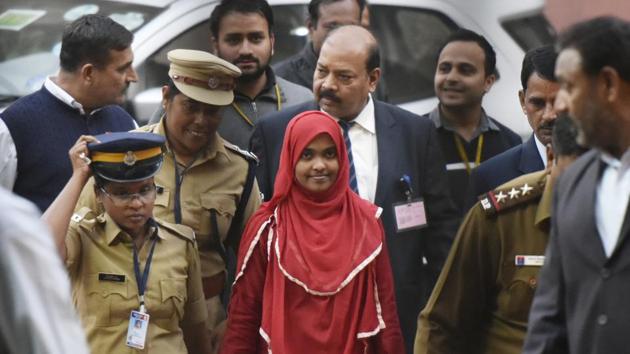At the heart of this controversy lies not so much the right of a woman to choose her religion and spouse, but society’s attitude to women
 Twenty-four-year-old Hadiya (In red dress) at the Supreme Court, New Delhi, India, November 27, 2017(Vipin Kumar/HT
Twenty-four-year-old Hadiya (In red dress) at the Supreme Court, New Delhi, India, November 27, 2017(Vipin Kumar/HT
We should be grateful for small mercies. On International Women’s Day, a day when hashtags were declaring ‘Time’s Up’ and ‘My Body is Mine’, our highest court reaffirmed a more basic right: the right of an adult citizen — woman citizen, I should clarify — to marry.
Social media was split into two camps: Those still convinced that the 24-year-old Hadiya was a victim of brainwashing and, thus, incapable of making rational choices, and those celebrating the court-ordered granting of her ‘freedom’.
But at the heart of the Hadiya controversy lies not so much the right of a grown woman to choose her husband and religion, but prevailing attitudes towards women by society at large. Seventy years after Independence and despite a Constitution that guarantees us equality and dignity, we are simply not to be trusted when it comes to decisions about personal life choices, particularly if those choices don’t meet with social approval. Well into a new century, women are still viewed as the property of their fathers and, then, husbands. It is not good news and certainly not worth celebrating.
Hadiya’s marriage to Shefin Jahan following her conversion to Islam has been problematic for not just her father, a self-declared atheist, but also the state and several Right-wing organisations that see a larger conspiracy of love jihad — an evil plot, in their eyes, that involves the seduction of gullible young Hindu girls by wily Muslim men with the express purpose of converting them to Islam. But the theory in this case falls flat: If Hadiya married Jahan — a man she met on a matrimonial site — after conversion, where is the conspiracy to convert her?
In a ghastly turn of events, in response to a petition filed by her father, the Kerala High Court ordered Jahan not to have contact with his wife, gave the parents ‘custody’, and even annulled the marriage on grounds that a “girl [sic] aged 24 is weak and vulnerable, capable of being exploited in many ways”. This was done despite numerous affidavits filed by Hadiya asserting that she had not been coerced into either conversion or marriage. But for the court, there was no question of granting this ‘weak and vulnerable’ woman agency.
The March 8 Supreme Court verdict does overturn that pernicious judgment. Did it have any other choice? A court-ordered NIA probe into a larger conspiracy angle continues, and one must wait to find out what evidence our anti-terror organisation eventually unearths.
And, yet, uncomfortable questions persist, starting with a scrutiny of why the marriage needed to be restored in the first place. After all, the right to marry, says Indira Jaising who, along with Kapil Sibal, represented Hadiya and Jahan in the Supreme Court, is a fundamental right.
Why didn’t the apex court reunite Hadiya and grant her freedom in November itself when it ruled that she could continue her studies under the ‘guardianship’ of her college principal?
In which democracy must an adult woman literally beg for her freedom before three judges? The very fact that we should talk of ‘custody’ and ‘guardianship’ of a 24-year-old woman is obnoxious. And it is the job of courts to protect individual civil liberties, not behave like a khap panchayat in whisking away disobedient daughters, says lawyer Apar Gupta.
The treatment meted out to Hadiya has been unjust, humiliating and cruel, and no compensation can be possible.
One wonders just how many Hadiyas are out there, battling social and parental pressure so that they can steer their own destinies? How many have the mental stamina to withstand such a prolonged pressure?
It should not have taken a court battle all the way to the Supreme Court, sustained media attention and a dogged pursuit of justice by Hadiya to win her freedom. That it came on a day when women all over the world were asserting their right to equality and freedom only reinforced the irony.
Namita Bhandare writes on social issues and gender
Twitter: @namitabhandare
The views expressed are personal